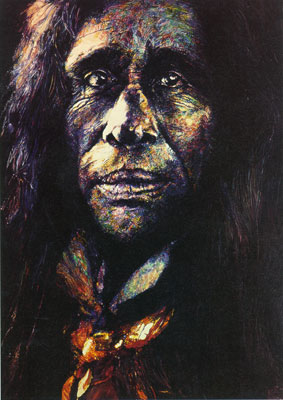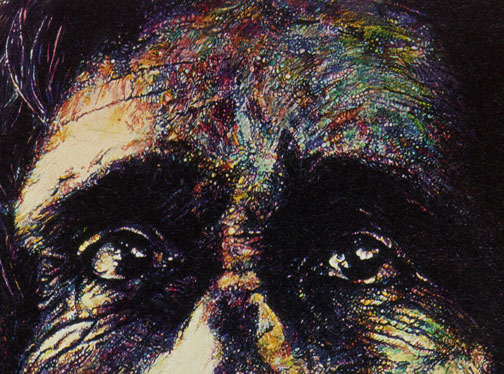
The idea that a painting could contain deeply hidden expressions
came to me in the Berkeley Art Museum in the summer of 1993,
on a pounding day when I had retreated into the museum to escape
the crowd and the noise and the heat.
Overloaded by the incessant
stimuli that I have never learned to shut out, I moved from painting
to painting, looking for some image in which I could take refuge.
It is one of the ways I try to deal with sensory overload --
seeking a single thing that absorbs my total attention,
so that
I forget everything that is overwhelming me from outside and
inside, and focus.
When I reached Joseph Raffael's
painting of a Pomo Indian, my confusion stopped, and I left my
overloaded, busy, noisy, stressful world and entered the world
of the painting.
It is a nighttime portrait -- a dark, almost black-and-white
work with a face suggested by myriad reflections, rather than
by the usual sense of outline and mass.
As I entered the painting,
I slowly became aware that I was seeing a face, insofar as it
could be seen, by reflection from an unseen fire below and unseen
stars above,
and perhaps the light (from the upper left) from
the sliver of a moon. To see the face at all is to intuit that
it is the face of a man alone, under the stars, in the desert,
over a dying fire.
The Pomo's face seemed to come to rest amid thousands of splinters
of light and darkness, in a symphony of sadness. It told of loss,
defeat, rejection,
of a way of life torn off, crumpled up, thrown
into the fire, and burning in its last ashes.
It told of the
frail thread that held the sure skills of the warrior, alone
in the vast Southwestern desert night, to his uselessness in
a world that had changed,
a world that did not need his knowledge,
a world that considered him at best irrelevant.
As the Pomo's eyes looked straight into me across the unseen
firelight, penetrating the deep desert darkness that seemed to
open up through the painting, like a window, his expression held
me with what seemed to be its awareness of its own condition.
He gradually took on the tragic dignity of those who lose everything
except awareness.
Then the expression on the Pomo's face modulated into something
that almost shocked me: His sadness was not for himself alone.
It was not only a sadness for his people, his way of life. He,
stripped of everything, alone in the huge and merciless desert,
in the dying firelight, under the undying stars, was feeling
sorry for me!
He -- brushed aside, invalidated by history,
relegated to irrelevance -- was looking at me as someone who
had not yet discovered the same things about myself, but sooner
or later would -- as everyone everywhere will eventually feel
the seeming solidity of their world dissolve into something even
more insubstantial than scattered reflections from firelight
and starlight in the desert darkness.

Then, perhaps 20 minutes into the painting, alone in this
corner of the gallery, I experienced one of the most remarkable
things I have ever seen.
All of a sudden, unrelated to anything
I had been seeing or thinking or feeling up to now, an entirely
different expression emerged from the flickering sadness of the
Pomo's face. "Emerged" is too slow a word. It was as
if the image suddenly leapt about 18 inches off the canvas and
stood planted there in three dimensional space.
The effect was similar to that of looking at one of those
computer-generated images that looks like a jumbled pattern until
your eyes find the right focus -- and at that point a three-dimensional
image leaps off the page at you with startling clarity.
The new face of the Pomo was still the face I had been seeing
as in an inexpressible pain over the loss of his world.
Only
it had been transformed, as if purified beyond all pain by a
radiant gladness that was not on the face but inside it, shining
through -- inside the night, shining through,
inside the firelight
and starlight, radiating through everything -- a great, glad,
peaceful, endlessly creative, undying light that he knew himself
to be part of and that, all along,
he had been trying to lead
me to see.
I
stood there, the two of us alone in a gallery,
tears streaming down my face,
while the Pomo that I had been feeling
sorry for, gave me his blessing.
Gerald Grow
Professor of Journalism
Florida A&M University
©Gerald Grow
This essay is reprinted with permission of the author.





